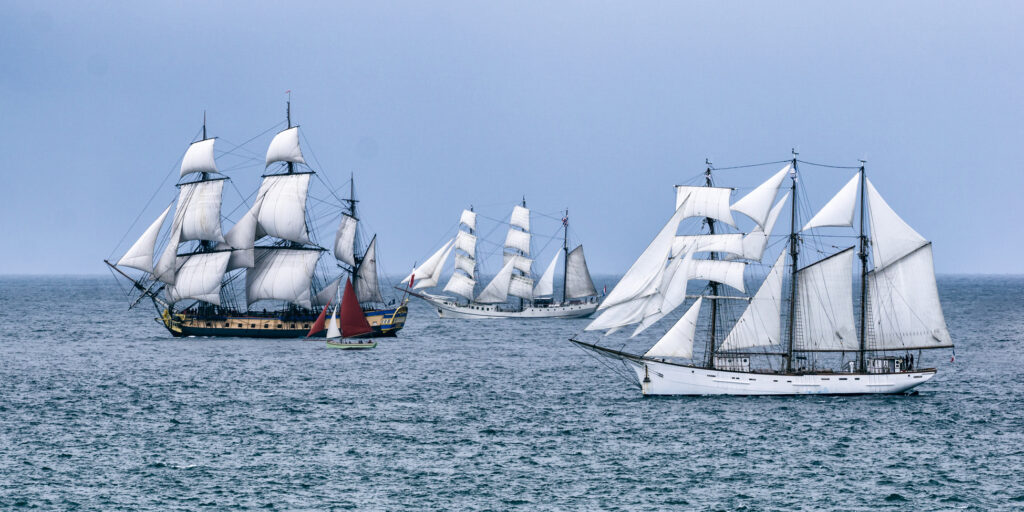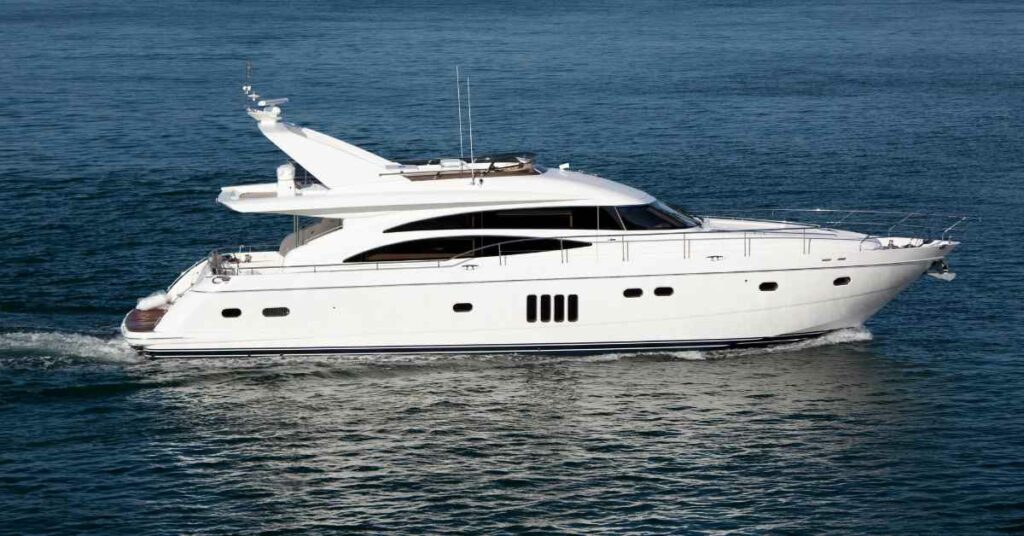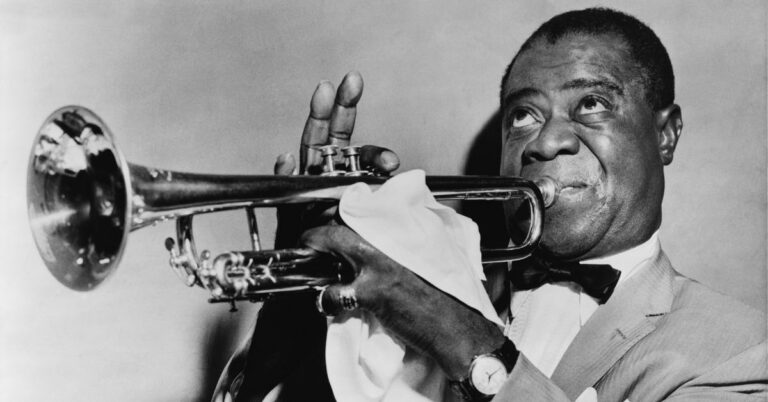
SailingEurope Blog - Sailing, Yacht Charter and Beyond


The Yacht – The Meaning and the Origin of the Word
In my language there are a few words for a floating object, or a vessel. According to the size and the purpose of the vessel, those words could be translated as “dinghy”, “yacht”, “boat” or “ship”. Some types of vessels have international names, for example “catamaran” or “hovercraft”.
What Does Yacht Mean?
However, when you say “ yacht” in my language, everyone know exactly what it is about. The word “yacht”, unlike other terms, has certain connotations. It always links with something classy, fancy, wealthy, elegant, and even glamorous.
For example, if you say that you have spent a week aboard a sailing boat , the recations of people will be more or less neutral. On the other hand, if you say that your week aboard a yacht was excellent, many people will become jealous. They will imagine you in a scene from a James Bond movie : aboard a massive white yacht in Monte Carlo , having a cold martini (shaken, not stirred)…
I wanted to share with you this language introduction because I found an interesting story about the word “yacht” and its origin. The word “yacht” became an English and an international term after an event that happened a long time ago.
How Do You Spell ‘Yacht’?

This word comes from the Dutch word “jacht”, which means “hunt”. Furthermore, “ j achtschepen” was the name for narrow, light and very fast sailing boats that the Dutchmen were using for intercepting larger and slower boats and ships.
One of the ‘hunters’ was given as a present to the British king Charles II . In His Majesty’s free time this vessel was not used for intercepting. Instead, was using it for fun. That is why the word “yacht” eventually became the term for vessels/boats made for pleasure.
I would highly appreciate comments from the native speakers of the English and Dutch languages. Especially since I am not one of them. No matter whether this story is true or not, it still sounds interesting to me.
Find out more about sailing quotes and phrases here .
I wish you a calm sea, a fine wind and a strong mast!
8 thoughts on “The Yacht – The Meaning and the Origin of the Word”
I looked up the origin of the word yacht, and it said it is a mid 16th century, Early Modern Dutch word from ‘jaght,’ from ‘jaghtschip’ meaning “fast pirate ship,” from ‘jaght’ which means “hunting” + ‘schip’ meaning “ship”.
I like the story of King Charles. It makes sense that that is why a yacht has the definite aura of wealth and pleasure!
Almost but not 100%. Actually the verb ‘jagen’ to hunt goes back to middle high German,i.e. Deutsch not Dutch, and before that it was ‘jagon’ in lower high German. But it seems that it all started with Greek and travelled North.
I guess that mid 16th century, the Dutch word jaght or jaghtschip was the word that got picked up. Not the earlier middle high German word where it came from.
Today it is jacht in Dutch, meaning hunting and it also the word for a luxury sailing boat.
In German Jagd is the word for hunt. Germans use the Dutch or English Jacht or Yacht for the boat.
Did the Germans design the original schooners? I think not! Since some Netherlanders speak a form of the Deutschland language, this word is shared (jacht/Dutch—jagd/German: meaning to hunt). It was the Dutch (Netherlanders) who designed the “flyut” or flute sailing ships, l-o-n-g before any British ever thought of such a ship—and—any German. The schooner grew out of the basic designs of the Dutch flute sailing ship (known for it’s speed). The Dutch economy relied heavily on trade and shipping, and were, thus, cutting edge innovators in ship building. Their engineering skills, was and is, plainly seen in their dike system, as well.
My father built a beautiful wooden replica of the”yacht” referred by the author (“Yacht Mary”) which was a present from the city of Amsterdam to King Charles II of England in 1660. They wrecked the ship a few years later (already too much partying on yachts, perhaps?)
I noticed the plaque that came with the model ship spelled the name as “Yatch” Mary. First, I thought, maybe, it was old English or Dutch spelling but it looks like it was just an error.
Nice, We have made an eplainermovie about this subject!
https://www.youtube.com/watch?v=l3HDZHF8w2E
In my head yogurt used to be spelled yoghurt and yacht used to be spelled yaught. Am I completely mis-remembering?
Dear Margaret, you are quite right for the spelling of the word yogurt that used to be, and sometimes still is, spelled with its old spelling yoghurt. However, there are no traces of the word yacht to have ever been spelled as yaught, but it would be best to take an etymology expert’s word for it.
Leave a Comment Cancel Reply
Your email address will not be published. Required fields are marked *
Save my name, email, and website in this browser for the next time I comment.
This site uses Akismet to reduce spam. Learn how your comment data is processed .

- Most Popular , Objects
Yacht Word Origin

The word “yacht” conjures images of sleek, luxurious vessels gracefully sailing the open waters. But have you ever wondered about the origin of this nautical term? In this article, we delve into the intriguing history and etymology of the word “yacht,” tracing its roots from the Dutch language to its modern-day association with opulent recreational boating.
A Dutch Connection: The Early Origins
The word “yacht” finds its origin in the Dutch word “jacht” or “jaght,” meaning “hunt” or “chase.” In the 17th century, these vessels were primarily used by the Dutch navy for pursuing pirates and engaging in coastal defense. Originally, a yacht was a fast and nimble sailing ship with a focus on performance rather than luxury.
Evolution into Leisure Craft
Over time, yachts transitioned from their naval purpose to become vessels of leisure and pleasure. As the wealthy elite began to embrace sailing as a recreational activity, yachts became synonymous with luxurious and stylish cruising experiences. The word “yacht” gradually shifted to represent high-end vessels designed for private enjoyment rather than military pursuits.
The word “yacht” traces its origins to the Dutch language, where it originally referred to ships used for hunting and defense. With the evolution of leisure sailing, yachts transformed into symbols of luxury and indulgence, capturing the essence of elegant and extravagant sea travel. Today, these magnificent vessels continue to fascinate as they grace the world’s waters, combining a rich history with the epitome of maritime leisure.

Articles You Might Like

Origin of the Word Cocktail

Origin of the Word Picnic

Snozzberry Word Origin

Alcohol Word Origin

Avocado Word Origin

Origin of The Word Slave
Share this article, more stories.

Jazz Word Origin

Coffee Word Origin

Chocolate Word Origin

Restaurant Word Origin

Ketchup Word Origin

Dude Word Origin
- 1.1 Etymology
- 1.2 Pronunciation
- 1.3.1 Derived terms
- 1.3.2 Translations
- 1.4.1 Translations
- 1.5 Anagrams
- 2.1 Etymology
- 2.2 Pronunciation
- 2.4 Further reading
- 3.1 Etymology
- 3.2 Pronunciation
- 3.4 References
- 3.5 Further reading
- 4.1 Etymology
- 5.1 Etymology
- 5.3 References
- 6.1 Etymology
- 6.3 References
- 7.1 Alternative forms
- 7.2 Etymology
- 7.3.1 Declension
- 7.3.2 Derived terms
- 7.4 Further reading
Circa 1557; variant of yaught , earlier yeaghe ( “ light, fast-sailing ship ” ) , from Dutch jacht ( “ yacht; hunt ” ) , in older spelling jaght(e) , short for jaghtschip ( “ light sailing vessel, fast pirate ship ” , literally “ pursuit ship ” ) , compound of jacht and schip ( “ ship ” ) .
In the 16th century the Dutch built light, fast ships to chase the ships of pirates and smugglers from the coast. The ship was introduced to England in 1660 when the Dutch East India Company presented one to King Charles II, who used it as a pleasure boat, after which it was copied by British shipbuilders as a pleasure craft for wealthy gentlemen.
Pronunciation
- ( UK ) enPR : yŏt , IPA ( key ) : /jɒt/
- ( US ) enPR : yät , IPA ( key ) : /jɑːt/ , /jɑt/
| Audio ( ): | ( ) |
- Rhymes: -ɒt
yacht ( plural yachts )
- 1897 December (indicated as 1898 ), Winston Churchill , chapter X, in The Celebrity: An Episode , New York, N.Y.: The Macmillan Company ; London: Macmillan & Co., Ltd. , →OCLC : The skipper Mr. Cooke had hired at Far Harbor was a God-fearing man with a luke warm interest in his new billet and employer, and had only been prevailed upon to take charge of the yacht after the offer of an emolument equal to half a year's sea pay of an ensign in the navy.
- 1907 August, Robert W[illiam] Chambers , chapter VI, in The Younger Set , New York, N.Y.: D. Appleton & Company , →OCLC : “I don’t mean all of your friends—only a small proportion—which, however, connects your circle with that deadly, idle, brainless bunch—the insolent chatterers at the opera, [ … ] , the chlorotic squatters on huge yachts , [ … ] , the neurotic victims of mental cirrhosis, the jewelled animals whose moral code is the code of the barnyard—!"
Derived terms
- motor yacht , motoryacht , MY
- sailing yacht , steam yacht , SY
- yacht person
Translations
| (yaḵt) (yaḵt) (zbosanav) (jáxta) (jáhta) (rwakhle) (tsiyu) (yóutǐng) , , , (iaxṭa) , (giot), (thalamigós) (yakhta) (yāxṭ) , (yotto) (äxta) (tuuk kɑmsaan) (yoteu) (yahta) (hư̄a bai) (jahta) (darvuult ongoc) (yât) (jáxta) , , (rʉʉa-bai), , (jáxta) , |
| (jahta) , (thalamigós) (yakhta) (fune), (bōto) , |
yacht ( third-person singular simple present yachts , present participle yachting , simple past and past participle yachted )
- ( intransitive ) To sail , voyage , or race in a yacht .
| (darvuult ongocoor javax) |
- Cathy , tachy , tachy- , yatch
Borrowed from English yacht , from Dutch jacht .
- IPA ( key ) : /jɔt/ , /jot/ , ( Canada ) /jat/
| Audio: | ( ) |
yacht m ( plural yachts )
Further reading
- “ yacht ”, in Trésor de la langue française informatisé [ Digitized Treasury of the French Language ] , 2012 .
Unadapted borrowing from English yacht .
- IPA ( key ) : /ˈjɔt/ [1]
- Rhymes: -ɔt
yacht m ( invariable )
- the letter Y in the Italian spelling alphabet
- ^ yacht in Luciano Canepari , Dizionario di Pronuncia Italiana (DiPI)
- yacht in Treccani.it – Vocabolario Treccani on line , Istituto dell'Enciclopedia Italiana
Borrowed from English yacht .
yacht ? ( plural yachts )
- ( Jersey ) yacht
Norwegian Bokmål
From Dutch jacht , via English yacht .
yacht m ( definite singular yachten , indefinite plural yachter , definite plural yachtene )
- “yacht” in The Bokmål Dictionary .
Norwegian Nynorsk
yacht m ( definite singular yachten , indefinite plural yachtar , definite plural yachtane )
- “yacht” in The Nynorsk Dictionary .

Alternative forms
yacht c
| Declension of | ||||
|---|---|---|---|---|
| Singular | Plural | |||
| Indefinite | Definite | Indefinite | Definite | |
| Nominative | ||||
| Genitive | ||||
- yacht in Svenska Akademiens ordlista ( SAOL )
- yacht in Svensk ordbok ( SO )
- yacht in Svenska Akademiens ordbok ( SAOB )
- yacht in Svenskt nautiskt lexikon (1920)
- English terms derived from Dutch
- English 1-syllable words
- English terms with IPA pronunciation
- English terms with audio links
- Rhymes:English/ɒt
- Rhymes:English/ɒt/1 syllable
- English lemmas
- English nouns
- English countable nouns
- English terms with usage examples
- English terms with quotations
- English verbs
- English intransitive verbs
- en:Watercraft
- French terms borrowed from English
- French terms derived from English
- French terms derived from Dutch
- French 1-syllable words
- French terms with IPA pronunciation
- French terms with audio links
- French lemmas
- French nouns
- French countable nouns
- French masculine nouns
- fr:Watercraft
- French loanwords with irregular pronunciations
- Italian terms borrowed from English
- Italian unadapted borrowings from English
- Italian terms derived from English
- Italian 1-syllable words
- Italian terms with IPA pronunciation
- Rhymes:Italian/ɔt
- Rhymes:Italian/ɔt/1 syllable
- Italian lemmas
- Italian nouns
- Italian indeclinable nouns
- Italian countable nouns
- Italian terms spelled with Y
- Italian masculine nouns
- Norman terms borrowed from English
- Norman terms derived from English
- Norman lemmas
- Norman nouns
- Jersey Norman
- nrf:Watercraft
- Norwegian Bokmål terms derived from Dutch
- Norwegian Bokmål terms derived from English
- Norwegian Bokmål lemmas
- Norwegian Bokmål nouns
- Norwegian Bokmål terms spelled with C
- Norwegian Bokmål masculine nouns
- nb:Watercraft
- Norwegian Nynorsk terms derived from Dutch
- Norwegian Nynorsk terms derived from English
- Norwegian Nynorsk lemmas
- Norwegian Nynorsk nouns
- Norwegian Nynorsk terms spelled with C
- Norwegian Nynorsk masculine nouns
- nn:Watercraft
- Swedish terms borrowed from English
- Swedish terms derived from English
- Swedish lemmas
- Swedish nouns
- Swedish common-gender nouns
- sv:Watercraft
- English entries with topic categories using raw markup
- Terms with Albanian translations
- Terms with Arabic translations
- Terms with Moroccan Arabic translations
- Terms with Armenian translations
- Terms with Azerbaijani translations
- Terms with Basque translations
- Terms with Belarusian translations
- Terms with Bulgarian translations
- Terms with Burmese translations
- Terms with Catalan translations
- Terms with Cherokee translations
- Mandarin terms with redundant transliterations
- Terms with Mandarin translations
- Terms with Czech translations
- Terms with Danish translations
- Terms with Dutch translations
- Terms with Esperanto translations
- Terms with Estonian translations
- Terms with Faroese translations
- Terms with Finnish translations
- Terms with French translations
- Terms with Galician translations
- Terms with Georgian translations
- Terms with German translations
- Terms with Greek translations
- Terms with Hebrew translations
- Terms with Hindi translations
- Terms with Hungarian translations
- Terms with Icelandic translations
- Terms with Irish translations
- Terms with Italian translations
- Terms with Japanese translations
- Terms with Kazakh translations
- Terms with Khmer translations
- Terms with Korean translations
- Terms with Kyrgyz translations
- Terms with Lao translations
- Terms with Latvian translations
- Terms with Lithuanian translations
- Terms with Macedonian translations
- Terms with Malay translations
- Terms with Manx translations
- Terms with Maori translations
- Terms with Marshallese translations
- Terms with Mongolian translations
- Terms with Norwegian Bokmål translations
- Terms with Norwegian Nynorsk translations
- Terms with Occitan translations
- Terms with Persian translations
- Terms with Polish translations
- Terms with Portuguese translations
- Terms with Romanian translations
- Terms with Russian translations
- Terms with Scottish Gaelic translations
- Terms with Serbo-Croatian translations
- Terms with Slovak translations
- Terms with Slovene translations
- Terms with Spanish translations
- Terms with Swedish translations
- Terms with Tagalog translations
- Terms with Thai translations
- Terms with Turkish translations
- Terms with Ukrainian translations
- Terms with Uzbek translations
- Terms with Vietnamese translations
- Terms with Volapük translations
- Mongolian terms with redundant script codes
- French entries with language name categories using raw markup
- Requests for gender in Norman entries
Navigation menu
- Nautical Sayings: Exploring the Fascinating World of Maritime Language
Ahoy there, fellow adventurers of the sea! Whether you're an experienced sailor or just someone fascinated by the world of nautical adventures, you've probably come across some intriguing and often perplexing maritime sayings. In this comprehensive article, we'll dive deep into the ocean of nautical sayings, yacht word origins, boating sayings, and the rich tapestry of nautical slang that has shaped the language of the high seas.
Setting Sail with Nautical Sayings
Ahoy, matey.
Our journey begins with the iconic greeting, "Ahoy, matey!" This classic nautical saying has been immortalized in countless pirate tales and seafaring adventures. But have you ever wondered about its origins and the fascinating history behind it?
The phrase "Ahoy, matey!" finds its roots in the 17th century when pirates and sailors needed a catchy and distinctive way to greet each other on the high seas. We'll explore how this phrase became a symbol of maritime camaraderie and adventure.
Charting the Course of Nautical Language
Before we delve into specific nautical sayings, let's navigate through the history of maritime language. The sea has always been a source of inspiration for unique expressions, and understanding the evolution of this language is key to appreciating its richness.
Maritime language is a dynamic blend of influences from various cultures, including English, Dutch, and even French. We'll journey through time to uncover how these linguistic influences shaped the nautical lexicon we know today.
Knots and Nautical Expressions
The maritime world is a treasure trove of fascinating expressions related to knots and ropes. From "tying the knot" to "left in the lurch," we'll unravel the meanings behind these captivating sayings.
Let's explore more nautical phrases related to knots, rigging, and seamanship. Each saying carries a unique history, often reflecting the practical challenges and traditions of sailors.
The Call of the Sea
Beyond greetings and practical expressions, sailors had a language of their own to communicate effectively on the vast expanse of the ocean. We'll delve into the lesser-known but equally intriguing nautical phrases that were used for signaling, navigation, and coordination.
Discovering Yacht Word Origins
The yacht: a luxurious icon .
Yachts epitomize elegance and luxury on the water. But have you ever wondered where the term "yacht" itself comes from? Let's set sail on a journey through time to explore its origins.
The word "yacht" has a fascinating history that dates back to the early days of sailing. We'll trace its evolution from humble beginnings to the opulent vessels we associate with yachts today.
Yacht or Jacht: A Linguistic Odyssey
Did you know that "yacht" is closely related to the Dutch word "jacht"? We'll uncover the linguistic connection between these two words and how it has influenced modern yacht culture.
The Dutch influence on yacht design and terminology is profound. We'll delve into how Dutch shipbuilders and explorers played a pivotal role in shaping the yacht industry.
The Golden Age of Yachting
Yachting isn't just about boats; it's a cultural phenomenon with a rich history. During the 19th century, the "Golden Age of Yachting" saw a surge in yacht building and racing. We'll explore this period and its impact on yacht word origins.
Sailing Through Boating Sayings
Smooth sailing ahead.
When it comes to boating, the saying "smooth sailing" is music to a captain's ears. Join us as we explore the origin of this optimistic phrase and how it reflects the sailors' eternal quest for favorable winds.
"Smooth sailing" isn't just a saying; it embodies the aspirations and experiences of mariners throughout history. We'll recount stories of legendary voyages and the calm seas that inspired this expression.
Weathering the Storm
Boating isn't always smooth sailing. Sometimes, sailors must "weather the storm." We'll examine the origin of this phrase and its enduring relevance to the maritime world.
Navigating storms at sea has always been a formidable challenge. We'll share tales of courage and resilience that shed light on the origins of this powerful metaphor.
Deciphering Nautical Slang
Aye, aye, captain .
Nautical slang is a language all its own, and "aye, aye, captain" is one of its most recognizable phrases. But what does it really mean, and why is it used so frequently on ships?
Read our top notch articles on topics such as sailing, sailing tips and destinations in our Magazine .
Check out our latest sailing content:
Introduction to chartering with a skipper, traditional sailor tattoos: meaning of the swallow, the most popular catamarans of 2023, explore tuscan archipelago in one week, skippered boats: how to pack for a yachting holiday, boat rental with skipper: everyone can go to sea, skippered boats: myths about sailing, sail from lefkada for 14 days. where to, what not to miss when visiting lefkada, skippered boats: step-by-step boat rental, where and why to sail from lefkas marina, don’t panic: handling maritime emergencies, skippered boats: how to choose a boat, the best sailing routes from biograd na moru, yachting away from ourselves: a voyage to inner peace, sail to the 7 most beautiful sights in greece, skippered boats: how to put together a crew, skippered boats: the most popular yachting destinations, what skipper's licence do i need, skippered boats: what you can experience when yachting, from lefkada or corfu to paxos and antipaxos, discover the paradise of paxos and antipaxoss, skippered boats: typical day on board, skippered boats: what it actually looks like on a boat, discover corfu: sailing adventure in the ionian, sextant and navigation: survival without gps, 5 best sailing routes in the bahamas, skippered boats: how much does a boat holiday cost, yachting guide to the bahamas, the ultimate yacht cleaning kit.
Swabbing the Deck: Nautical Work Lingo
"Swabbing the deck" might sound like a chore, but it's also a nautical saying with a rich history. We'll uncover its origins and its role in the daily life of sailors.
Navigating Ship Sayings
Shipshape and bristol fashion .
When something is "shipshape and Bristol fashion," it's in excellent condition. Discover the intriguing story behind this phrase, which hails from the bustling port city of Bristol.
Between the Devil and the Deep Blue Sea
Sometimes, sailors find themselves "between the devil and the deep blue sea." Explore the origins of this saying and the predicaments it describes.
Exploring Boat Phrases
In the same boat .
We often say we're "in the same boat" when facing a common challenge. But where does this saying come from, and why do we use it to express solidarity?
Casting Adrift: Origins of "Adrift"
Being "adrift" can have a figurative meaning beyond just being at sea. Discover the roots of this saying and how it found its way into everyday language.
Unraveling Nautical Expressions
By and large: a nautical measurement .
The phrase "by and large" has nautical origins tied to sail trimming. Join us as we explore the history of this saying and its transition to everyday language.
Three Sheets to the Wind: A Nautical Reference to Intoxication
Have you ever heard someone described as being "three sheets to the wind"? Learn about the nautical basis of this humorous expression.
Boating Phrases and Sailor Jargon
"know the ropes": mastering the art of sailing.
To "know the ropes" means to be skilled and knowledgeable. We'll sail through the history of this saying and its significance for sailors.
"The Whole Nine Yards": Nautical or Not?
Is "the whole nine yards" a nautical phrase? We'll unravel this linguistic mystery and see if it has nautical origins or not.
Sailing Expressions and Seafaring Terms
"batten down the hatches": preparing for a storm.
When sailors "batten down the hatches," they're preparing for a storm. Discover the practical origins of this vital nautical saying.
"Between the Devil and the Deep Blue Sea": A Nautical Dilemma
We revisit the phrase "between the devil and the deep blue sea" to explore its deeper connotations in the context of seafaring.
Nautical Words and Phrases: A Sailor's Lexicon
Nautical sayings: the ultimate lexicon .
Summarizing our exploration, we'll compile a comprehensive list of some of the most intriguing nautical words and phrases that have left their mark on the English language.
As we sail back to the shore of this captivating journey through nautical sayings and maritime language, it's clear that the sea has not only inspired adventurers but also enriched our vocabulary with colorful expressions. From "ahoy, matey" to "the whole nine yards," each saying carries a piece of nautical history that continues to resonate with us today.
So what are you waiting for? Take a look at our range of charter boats and head to some of our favourite sailing destinations.
I am ready to help you with booking a boat for your dream vacation. Contact me.

Denisa Nguyenová

COMMENTS
I looked up the origin of the word yacht, and it said it is a mid 16th century, Early Modern Dutch word from ‘jaght,’ from ‘jaghtschip’ meaning “fast pirate ship,” from ‘jaght’ which means “hunting” + ‘schip’ meaning “ship”.
The term, yacht, originates from the Dutch word jacht (pl. jachten), which means "hunt", and originally referred to light, fast sailing vessels that the Dutch Republic navy used to pursue pirates and other transgressors around and into the shallow waters of the Low Countries.
The word “yacht” traces its origins to the Dutch language, where it originally referred to ships used for hunting and defense. With the evolution of leisure sailing, yachts transformed into symbols of luxury and indulgence, capturing the essence of elegant and extravagant sea travel.
yacht (plural yachts) A slick and light ship for making pleasure trips or racing on water, having sails but often motor-powered. At times used as a residence offshore on a dock.
In this comprehensive article, we'll dive deep into the ocean of nautical sayings, yacht word origins, boating sayings, and the rich tapestry of nautical slang that has shaped the language of the high seas.